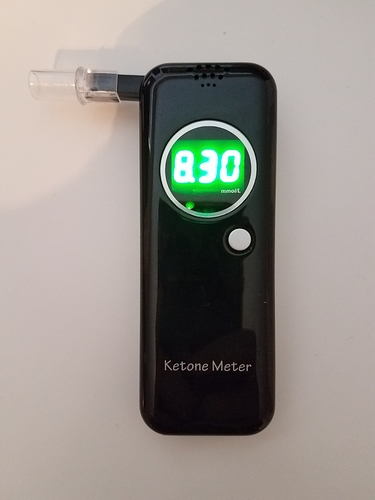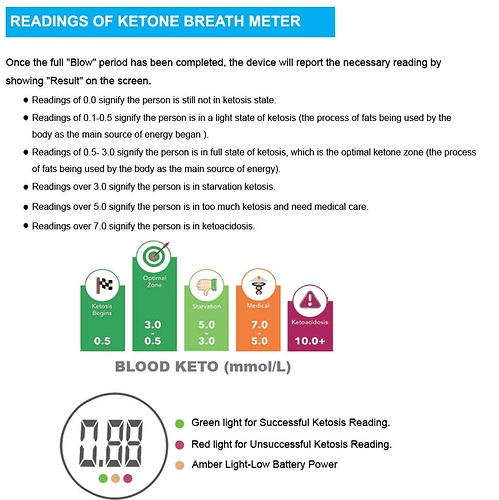Hello guys, I stopped to eat carbon-food about a month ago, and I normally eat meat, avocado and vegetables. I take a meal 2 times a day so I didn’t lose any weight. But the problem is sometimes I noticed my blood ketone level is very high ~ 8 or 9 mmol/L, especially after exercise. Am I in danger? Do I need to lower it down? What is the best blood ketone level? How can I lower the blood ketone level down without taking any carbon-food? Thank you very much if anyone can help me with these concerns! BTW, what is the relation between exercise and blood ketone level😬
Question about blood ketone level
You say you’ve noticed your blood ketone level is very high. Yet the photo you provide is of a typical alcohol breathalyzer not a blood ketone meter. How did you get the idea you are measuring blood ketones with this device? You are not.
The breathalyzer in your photo has a semiconductor sensor. They are designed to measure breath alcohol. It’s only due to a fluke of the sensor used in these things that enables it to measure acetone in breath. Even then, it’s possible it’s not actually measuring acetone but isopropanol.
Although a number of these devices are marketed as ‘ketone breathalyzers’ they are not. So the numbers you are getting with this device are essentially meaningless. See this.
That said. If you are not a type1 diabetic then eating a ketogenic diet will not put you in any danger.
That’s a very cool chart. But the device is still an alcohol breathalyzer that is not measuring anything meaningful to ketosis. If you really want to measure blood ketones, buy a blood ketone device. If you want to measure breath acetone, buy a Ketonix.
Thank you very much! I will try Ketonix. This ketone breathalyzer gave me similar results as the testing strips. And when I ate some rice, the reading would gradually decrease to 0 within several hours. So it might be not accurate, but still can say something.
Welcome to the forum @stream.
You know rice is not on the Keto meal plan, eh?
Basic Keto is 20 grams or less of Carbs, NO Sugar, adequate protein, healthy fats, make sure you are eating enough calories, drinking a lot of water, and getting Electrolytes.
You can download cronometer.com for free to track all your foods you are eating and see how you are coming out on your carbs/fats/proteins and calories.
You don’t have to spend a bunch of money and buy all these machines and strips, etc to do Keto. Just stick to the basics and eat whole real foods that are Keto. Good luck =). If you have any more questions, ask away. The forum is full of friendly, helpful people =).
Thank you for your suggestions! Yeah I was thinking the reading was too high (8 mmol/L) so I tried to eat some rice to see what would happen. After eating some rice, the reading of ketone breathalyzer did gradually decrease to zero. Today I got reading of 8 mmol/L again, but I don’t want to eat any carbon-food anymore. I just bought ketonix to ensure I can get accurate test result. Hope this works better.
Since I am a beginner, I try to monitor the change in my body (like ketone) as much as I can. I also plan to try fast for 1 to a few days. And maybe with high level exercise. I guess monitoring ketone level is important during these processes.
You can measure whatever you want, but use the appropriate tool to do so. Many of us like to measure and record data. But bear in mind you get very ‘noisy’ data that is difficult to interpret. This because you are taking snapshots of a very dynamic system that changes constantly, minute to minute.
Blood meters only measure the concentration of β-hydroxybutyrate in your blood. β-hydroxybutyrate is ‘available fuel’, not necessarily ‘used fuel’. A blood meter does not measure the acetoacetate in your blood which is also ‘available fuel’, not necessarily ‘used fuel’. So at best you’re getting only partial information about the availability of ketones. The meters also do not measure fatty acids, which are the primary energy source while in ketosis. Ketones, after all, are a byproduct of fatty acid metabolism. β-hydroxybutyrate also acts like a hormone in many cells and organs, so it’s concentration is an indication of that as well.
Urine test strips only measure acetoacetate excreted in urine. They do not tell you how much acetoacetate is present in the blood. Acetone breathalyzers only tell you the concentration of acetone in your breath. They do not tell you how much is still dissolved in your blood. Although, since aceteacetate ‘breaks down’ to acetone and CO2 at a more or less known rate, the concentration of acetoacetate in the blood can be indirectly inferred by breath acetone concentration.
Anyway, have fun but don’t get too obsessed over any numbers you get by measuring anything.
Thank you for the explanations! I was trying to maintain the “ketone” at a proper level. Right now it seems to be totally wrong. I think I only need stick to no carbohydrate.
The objective is fat adaptation, not ketones. Stay sub-20 grams of carbs per day and you will be in ketosis and your liver will produce as many ketones as you need. As your metabolism, cells and organs gradually become better adapted to utilizing fatty acids, your ketones will probably drop. This is normal.
I’d say you don’t really need a device to measure ketones, unless you have a specific need to maintain a certain level. For me, I’ve had trouble getting consistent readings with the ketonic. I rely more on the blood meter (Precision Xtra)


